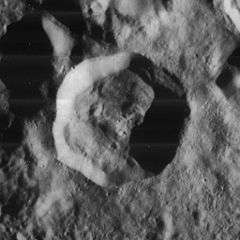Pettit (lunar crater)
|
Lunar Orbiter 4 image | |
| Coordinates | 27°30′S 86°36′W / 27.5°S 86.6°WCoordinates: 27°30′S 86°36′W / 27.5°S 86.6°W |
|---|---|
| Diameter | 35 km |
| Depth | Unknown |
| Colongitude | 87° at sunrise |
| Eponym | Edison Pettit |
- Not to be confused with Petit, another lunar crater.
Pettit is a lunar impact crater that lies near the western limb of the Moon. In this location the crater is viewed nearly from the side by observers on Earth, and visibility can be significantly affected by libration effects.
The crater lies among the rugged features of the Montes Rook, the inner ring of mountains that surround the Mare Orientale impact basin. It is nearly a twin of the crater Nicholson which lies less than one crater diameter to the northeast. Another similar formation is Wright almost due south.
The rim of this crater has something of the appearance of a rounded hexagon, with slightly flattened rims to the east and west. The rim is sharp-edged, and the inner wall material has slumped down to lie in a pile around the base. The interior floor is a rugged jumble, with a small central peak and hills to the north and west. Beyond the rim lies rugged terrain to the north and west, while the ground becomes less jumbled to the southeast beyond the edge of the mountain foothills.
This formation should not be mistaken for ths similarly named crater Petit, a small feature on the eastern half of the Moon's near side.
Satellite craters
By convention these features are identified on lunar maps by placing the letter on the side of the crater midpoint that is closest to Pettit.
| Pettit | Latitude | Longitude | Diameter |
|---|---|---|---|
| C | 24.8° S | 88.9° W | 8 km |
The following craters have been renamed by the IAU.
- Pettit T — See Shuleykin (crater).
References
- Andersson, L. E.; Whitaker, E. A. (1982). NASA Catalogue of Lunar Nomenclature. NASA RP-1097.
- Blue, Jennifer (July 25, 2007). "Gazetteer of Planetary Nomenclature". USGS. Retrieved 2007-08-05.
- Bussey, B.; Spudis, P. (2004). The Clementine Atlas of the Moon. New York: Cambridge University Press. ISBN 978-0-521-81528-4.
- Cocks, Elijah E.; Cocks, Josiah C. (1995). Who's Who on the Moon: A Biographical Dictionary of Lunar Nomenclature. Tudor Publishers. ISBN 978-0-936389-27-1.
- McDowell, Jonathan (July 15, 2007). "Lunar Nomenclature". Jonathan's Space Report. Retrieved 2007-10-24.
- Menzel, D. H.; Minnaert, M.; Levin, B.; Dollfus, A.; Bell, B. (1971). "Report on Lunar Nomenclature by the Working Group of Commission 17 of the IAU". Space Science Reviews 12 (2): 136–186. Bibcode:1971SSRv...12..136M. doi:10.1007/BF00171763.
- Moore, Patrick (2001). On the Moon. Sterling Publishing Co. ISBN 978-0-304-35469-6.
- Price, Fred W. (1988). The Moon Observer's Handbook. Cambridge University Press. ISBN 978-0-521-33500-3.
- Rükl, Antonín (1990). Atlas of the Moon. Kalmbach Books. ISBN 978-0-913135-17-4.
- Webb, Rev. T. W. (1962). Celestial Objects for Common Telescopes (6th revised ed.). Dover. ISBN 978-0-486-20917-3.
- Whitaker, Ewen A. (1999). Mapping and Naming the Moon. Cambridge University Press. ISBN 978-0-521-62248-6.
- Wlasuk, Peter T. (2000). Observing the Moon. Springer. ISBN 978-1-85233-193-1.
